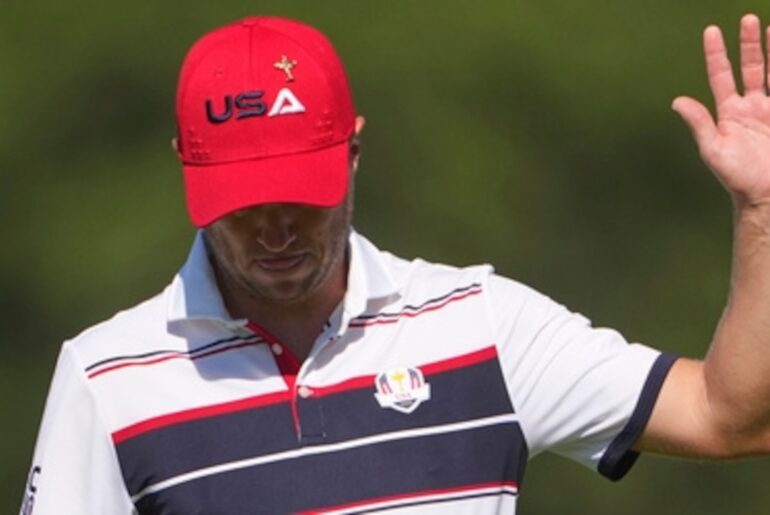But over the years, it has degenerated into a jingoistic battle that inspires nationalistic fervor more than sportsmanship, while being a money-maker for people and broadcasters who are already ridiculously rich.
It was Mark Twain who described golf as “a good walk spoiled.”
Or was in Oscar Wilde?
Probably both of them. Great minds think alike, and you’d never catch those two on a golf course.
I always wondered what Robert Burns, the Scottish bard from the country that invented golf and made it accessible to not just the affluent but the common man, thought of the game.
Alas, Burns never really said anything specifically about golf, though he did say something that resonates with every golfer: “The best-laid schemes o’ mice an’ men gang aft agley.”
Which, translated, means when you hit a five-iron from 180 yards into the wind, you’re dreaming, pal.
I have always been amused by reactions to the behavior of fans at the Ryder Cup, as if that behavior appeared out of the ether. The sponsors of the event purposely drive the narrative of two cultures at war, all but handing out clubs made of iron or graphite or verbosity so the plebs can beat others to prove some sort of supremacy.
And, so, what is that supremacy? That we have better dental care? That their trains are better than Amtrak? Our food is cheaper? Their food is better? Our multi-millionaire golfers are better than their multi-millionaire golfers?
The golf itself, by the way, was spectacular. The players, from both continents, were amazing this year. The problem, as usual, was the fans. Especially the American fans, who make the European fans seem like Buddhist monks.
We in Boston like to take credit for stuff that happened years ago, like the Revolution, when we told the Brits to take a hike, no kings, no taxation without representation.
But if we’re gonna own the good stuff, we need to own the bad stuff, too.
By the estimation of most golf historians, the sorry state of incivility at the Ryder Cup, the coarsening of American golf fans, began right here in the Hub of the Universe. Well, Brookline, if you’re being technical about it.
In 1999, the Ryder Cup was played at The Country Club, where some people who wouldn’t be allowed in the clubhouse door for a membership interview acted like complete jackasses, screaming vile abuse at the European team.
The nicest thing those bleating morons said about Colin Montgomerie, the great Scottish golfer, is that he looked like Mrs. Doubtfire.
One of the hecklers yelled, “Shank it, you fat pig!”
Montgomerie’s father was so disgusted by the verbal abuse hurled at his son that he left the course after seven holes.
Montgomerie’s wife soldiered on, and endured the most vile verbal abuse imaginable. To his enduring credit, Payne Stewart, the great American golfer who died way too young, stuck up for Montgomerie and pointed out some of the offenders, so cops could toss them.
I’m wondering if, when those guys – and they were all guys, back then – tell their kids about their youthful exploits, do they say, “Well, son, one of my favorite memories is when I threw a beer at a Scottish golfer’s wife and called her vile names.”
Well, fast forward to Farmingdale, New York, where the Ryder Cup was held over the weekend at Bethpage Black, an absolutely beautiful golf course that is actually part of a state park on Long Island and open to the public.
The American golf bros at Bethpage Black outdid the get-a-lifers who set the gold standard for boorish behavior in Brookline.
The things they shouted at Rory McIlroy, the Northern Irishman who is one of the game’s all-time greats, are not printable, and even couching them in euphemisms is not worth giving attention to the degenerates who uttered them. They also managed to ape the drunks in Brookline by dousing McIlroy’s wife, Erica, an American, with beer and obscene language.
An MC hired by the PGA of America, which sponsored the Ryder Cup, led some spectators in a vulgar chant against McIlroy. That MC is a woman, proving that the cretinous behavior at the Ryder Cup has evolved to include those other than beer-swilling bros.
McIlroy and his fellow Irishman and playing partner, Shane Lowry, who makes County Offaly proud every time he steps on a golf course, answered the losers who shouted abuse by draining putt after putt.
Going into the final day, the Europeans had a commanding lead, but the American team made a valiant, almost historic comeback in the singles matches, falling just short.
It was very fitting, then, that it was Lowry, a decent guy who had to be restrained from going after McIlroy’s hecklers and who instead pointed them out for the cops to bounce, retained the cup for Europe with his birdie putt on the 18th.
Golf is contrary to the human condition, in that it humiliates its practitioners more than rewards them. It is extremely difficult and yet, when played at the highest level, extremely lucrative, both financially for the pros, and psychologically for the weekend hackers. There’s nothing quite as satisfying as hitting one really good shot after a series of bad ones.
Our culture has captured golf in all its faults and glory, coarsening and cheapening what was always thought to be a gentlemen’s game.
Like many working-class kids, I first learned about golf by watching The Three Stooges, the episode when the Stooges, who were trying to fit in at a country club where they clearly didn’t belong, go golfing.
So Moe goes, “Whaddya know? We’re in the middle of one.”
And Larry goes, “The middle of what?
So Moe goes, “A golf place.”
And Curly says, “I don’t see any golfs.”
At which point, Moe smacks Curly on the head, and Curly goes, “Oooh! Look at the golfs!”
As stupid and as juvenile as that sounds, it would probably be better to broadcast that Stooges episode on a loop rather than stage the Ryder Cup again.
It would elevate the conversation.
Kevin Cullen is a Globe columnist. He can be reached at kevin.cullen@globe.com.







